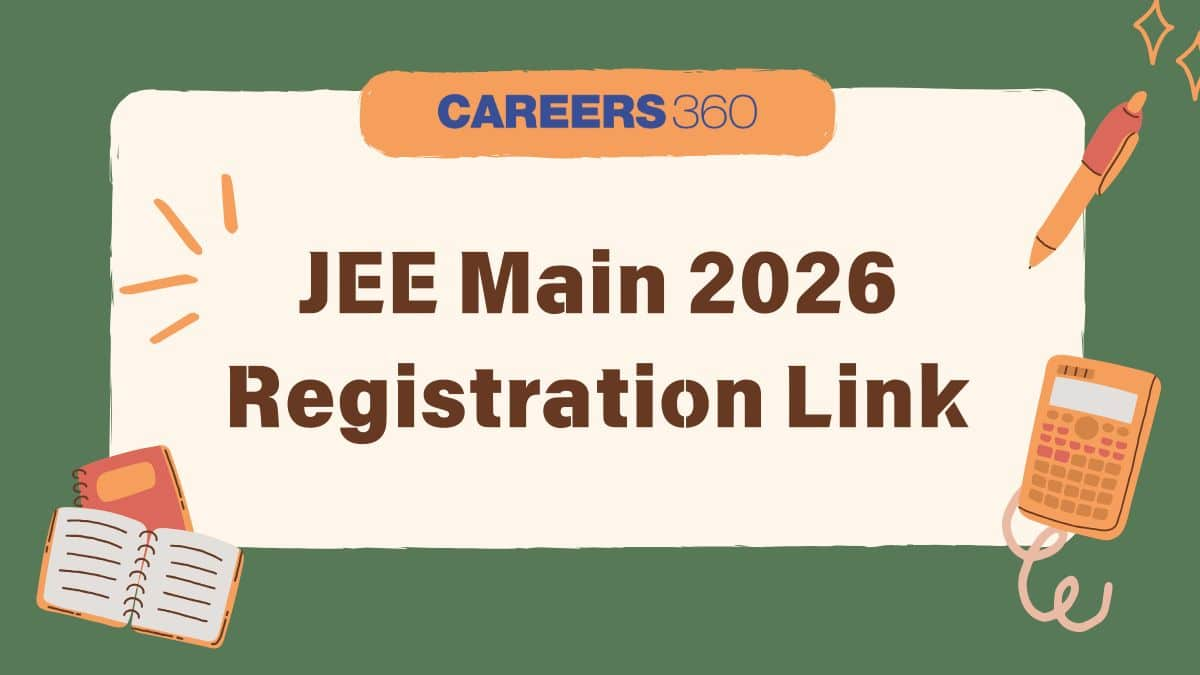Amity University-Noida B.Tech Admissions 2026
Among top 100 Universities Globally in the Times Higher Education (THE) Interdisciplinary Science Rankings 2026
JEE Main 2026 Registration Link: The National Testing Agency has activated the JEE Main 2026 session 2 registration link on February 1, 2026. The JEE Main 2026 April session application form is now available on the official website, jeemain.nta.nic.in. The last date for the session 2 JEE Main 2026 registration is today, February 25, 2026 upto 9.00 P.M. All candidates who submit the online JEE Main 2026 application form and pay the examination fee by today, 11.50 PM. Candidates are advised to carefully read the Information Bulletin and Admissions Guidelines 2026. Registered candidates will be eligible to appear for the entrance exam, and their admit cards will be uploaded on the website. The authority will conduct the JEE Main 2026 exam session 2 from April 2 to 9, 2026. Read the article to know when and where to access the JEE Mains registration link.
Direct Link to Registers for JEE Main 2026 session 2 exam
This Story also Contains

JEE Main 2026 Registration Link
The authority has activated the session 2 JEE Main registration 2026 link online. Below are the dates to access the JEE Main registration link online as per the official notification.
| Event | Dates |
|---|---|
Start of JEE Mains session 2 registration | February 1, 2026 |
| Last date to submit the JEE forms | February 25, 2026 (Up to 9.00 P.M) |
Release of JEE Main Session 1 Registration Link | October 31, 2025 |
Last date to access JEE Main application link | November 27, 2025 (Up to 9:00 P.M.) |
To get the online JEE Mains application link, candidates needed to visit the official website. Alternatively, candidates will be able to access the JEE Mains application form link from this article. To apply for the JEE Mains 2026 without any hassle, applicants had to use the registration link within the given duration. During the registration last date, candidates may have faced issues while accessing the JEE Main form link.
Indian citizens, NRIs, OCIs (Overseas Citizens of India) and PIOs (Persons of Indian Origin) who have completed/are appearing in Class 12 are eligible to apply for Joint Entrance Examination Main 2026. There is no minimum or maximum age limit to access the JEE Main registration link. However, candidates can appear for three consecutive years after qualifying 12th standard.
After the release of JEE Main application form link, candidates first need to visit the official website, jeemain.nta.nic.in.
Now, register for the exam by entering the basic personal details like name, date of birth. Gender, father’s name to generate the application number.
With the system generated application number and password, candidates need to login to their account and fill in the information asked for which are education details, complete address, test centre preference and more.
Now, upload the requisite documents and pay the application fee online.
Lastly, click on "Submit" to fill the JEE Main application form.
Only candidates who will submit the JEE Main online form on time will be able to get their JEE admit card.
After accessing the JEE Main application link, candidates should carefully upload all the mandatory documents in the specified format. Failing to do so may lead to cancellation of the JEE Main registration.
Upload Scanned Images of Candidate’s Photograph
Candidate's signature
Class 10 or Equivalent Certificate/Marks-sheet
Identity Proof (wherever applicable)
PwD/PwBD/UDID Certificate
Among top 100 Universities Globally in the Times Higher Education (THE) Interdisciplinary Science Rankings 2026
Last Date to Apply: 28th Feb | Ranked #43 among Engineering colleges in India by NIRF | Highest Package 1.3 CR , 100% Placements
Frequently Asked Questions (FAQs)
The JEE Mains registration link for session 2 will be activated by February 25, 2026, up to 9.00 P.M.
The last date for the JEE Main 2026 registration is February 25, 2026 upto 9.00 P.M.
Candidates can check the JEE Main 2026 registration link on the official website, jeemain.nta.nic.in.
On Question asked by student community
decent chances actually as home state quota seats are 50%. allotments will depend on the JEE rank and not percentile though. in 2025, for female supernumerary it closed at 9286 rank while for open gen it closed at 5573.
So, would advise to use this tool to check the probable
yes you will. Ususally the return is within 7 days i it has failed at the gateway level which it seems to be. Please wait. You will get the money back
Slim chances as in 2025 the closing rank was 118 for SPA Delhi for B.Arch. You will need to wait for the rank list to come in April before getting a better picture. Please check https://engineering.careers360.com/jee-main-college-predictor for the predictions.
Check out https://engineering.careers360.com/jee-main-rank-predictor to know the probable rank
Hi Smita Sharma,
With 47 percentile in JEE Mains 2026, you might get rank around 7,00,000 plus which is very high. Check the link below for the Best engineering colleges available for you based on yours percentile.
Link 1: https://engineering.careers360.com/colleges/list-of-engineering-colleges-in-pune-accepting-jee-main
Hey Abhinav!
You can start your JEE Preparation with ICSE. You can check How to Prepare for JEE Main 2026?- Study Plan and start you preparation.
Among top 100 Universities Globally in the Times Higher Education (THE) Interdisciplinary Science Rankings 2026
Recognized as Institute of Eminence by Govt. of India | NAAC ‘A++’ Grade | Upto 75% Scholarships
70th University Ranked by NIRF | 80th Engineering Rank by NIRF | Accredited by NBA and NAAC A+
Last Date to Apply: 28th Feb | Ranked #43 among Engineering colleges in India by NIRF | Highest Package 1.3 CR , 100% Placements
Highest CTC 44.14 LPA | UGC Approved | 1600+ Recruiters | 100% Placement
NAAC A++ Grade | Recognized as Category-1 Deemed to be University by UGC | 41,000 + Alumni Imprints Globally